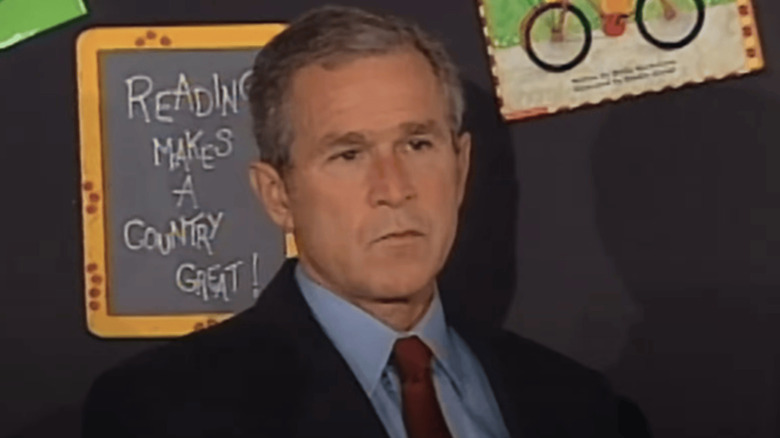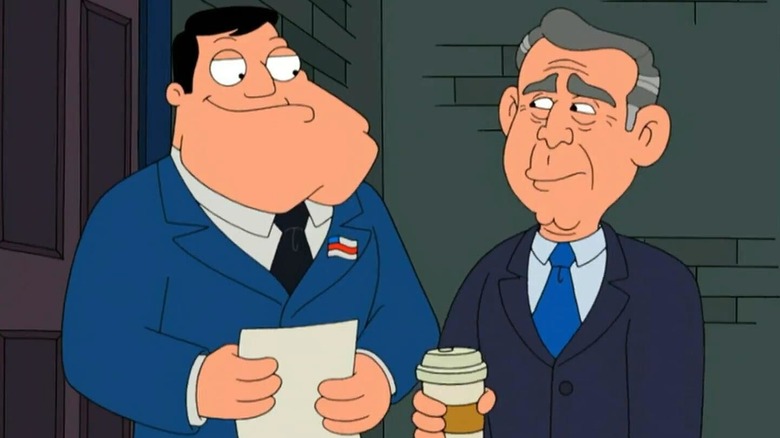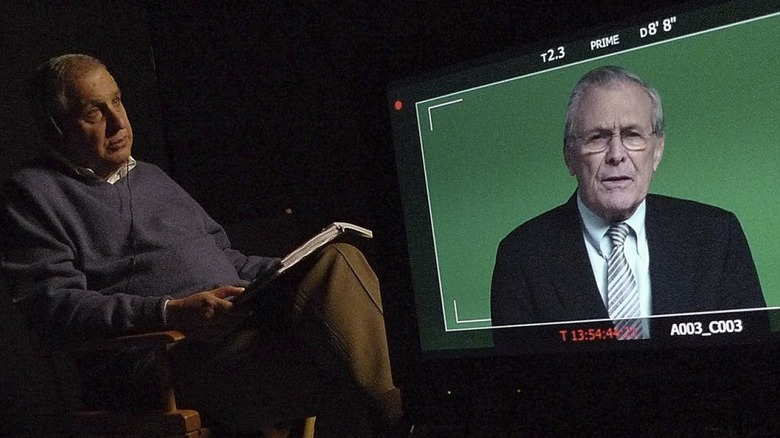George W. Bush Won A Razzie For This Controversial Movie With 82% On Rotten Tomatoes
Michael Moore's 2004 documentary "Fahrenheit 9/11" was an up-to-the-moment portrait of how the United States was feeling during the bumble-some George W. Bush administration. Moore traces the very sloppy, deliberate, unforced wartime errors that Bush made at the time, depicting how he harnessed anti-terrorist rhetoric to begin unneeded conflicts across the Middle East. The mood was heated, and the rhetoric was fiery. Bush's wars were foolish and destructive and accomplished little. Moore and many others of his age bracket expected the public to rise up with folk songs, protests, and make the angry demand that Bush stop the wars and dismantle the persistent war machine. Moore captured a time, however, when many were feeling either hopeless about the future, or openly gung-ho about American military might. The popular music of the time was less "We the people don't want a war" and more "We'll put a boot in your ass, it's the American way."
Moore's doc cobbled together some of George W. Bush's most embarrassing moments in his presidency up to that point. Bush's speaking style was nasally, unsure, and inarticulate. And yet, he tried to affect "tough" talk, saying things like "you're with us, or you're with the terrorists." Bush sounded like a nerd who aspired to be a bully. Moore wasn't convinced, and famously pushed "Fahrenheit 9/11" onto TVs, hoping that it would dissuade voters from re-electing Bush. Sadly, it didn't work.
The most damning scene comes when Bush is captured, on camera, at the moment when he is informed that two planes have flown into the World Trade towers in New York. Rather than leave immediately, Bush sat quietly in a children's classroom, listening to a teacher read a picture book to children, clearly at a loss as to what he should be doing.
As a way to condemn Bush and to praise Moore's film, the people in charge of the Golden Raspberry Awards awarded the president the Razzie for Worst Actor. A dubious honor indeed.
George W. Bush gave a terrible performance in Fahrenheit 9/11
"Fahrenheit 9/11," it should be noted, was widely loved by audiences. Made for only $6 million, it racked up over $222 million in ticket sales. Moore had already won an Academy Award for his 2003 film "Bowling for Columbine," and had come to be a central voice of the working-class Left after making his debut feature, "Roger & Me," in 1989. His shows "TV Nation" and "The Awful Truth" cemented his impish talents at pranking billionaires, and, for a spell, one might see Moore trekking into corporate headquarters to confront CEOs about their use of sweatshops or their overwhelming abuse of corporate welfare payouts. Not everyone appreciated Moore's strident voice and anecdotal form of reporting, but he was seen as an important voice in pop Left Wing punditry.
Naturally, Moore hated George W. Bush. He was a lame duck who lost the popular vote and barely squeaked into office under dubious circumstances. When the World Trade Center attacks happened on his watch, he consistently made the worst possible decisions in response. Wasteful wars began, and they would persist for literally decades. Osama bin Laden wouldn't be apprehended until Obama was in office. American soldiers didn't pull out of Afghanistan until Biden was in office. Moore saw that Bush was making unforced errors and telling brazen lies about his motivations for a War on Terror, and wanted to document it with "Fahrenheit 9/11." It was just a movie, but it was a vocal protest over what was happening in the government at the time.
The Razzies are typically an apolitical body, giving their "awards" to the worst movies of the year. The Razzies are just a gag, of course, and they typically (and frustratingly) swing at low-hanging fruit. They give awards to notorious movies that the public already hates, and get a little mean-spirited in their ceremonies.
Donald Rumsfeld and Condoleezza Rice also won Razzies
With "Fahrenheit 9/11," though, the Razzies decided to get political. If it was their job to pick on the worst of the year, then Bush, they declared, should get a shout-out. It was an ideal way to throw shade on a president who was over-flexing his executive powers.
And the Razzies didn't reserve their rancor for Bush alone. "Fahrenheit 9/11" won three Razzies in toto. Donald Rumsfeld, the U.S. Secretary of Defense during the W. administration, won Worst Supporting Actor. Rumsfeld was a curious character who spoke in poem-like aphorisms and espoused a violent, pro-war attitude. His bungling of the post-9/11 wars in the Middle East are detailed in Errol Morris' 2014 documentary "The Unknown Known." Also, Bush co-won the Razzie Award for Worst Screen Couple, an honor he shared with Condoleezza Rice, the U.S. Secretary of State at the time. Ordinarily, the Razzies would have been content to make fun of Martin Brest's "Gigli," or to lambaste Michael Bay for the umpteenth time. In 2004, though, they wanted to put their money where their mouth was, and dishonor the members of the Bush administration. Was it gimmicky and silly? Yes. Was it appreciated? Also yes.
Moore hasn't cooled his rhetoric, and continued to make movies that are deeply critical of money-grubbing ultra-corporations, mishandled American social programs, and downright evil Right Wing politicians in America. In 2007, he made "Sicko," about America's broken healthcare system. In 2009, he came after Bush again with "Capitalism: A Love Story," all about the Bush-motivated financial crisis of 2008. In 2018, Moore made a sequel of sorts called "Fahrenheit 11/9," which was a sharp takedown of Donald Trump and his endless string of idiotic, selfish, dastardly gaffes.
Incidentally, Trump as also won a Worst Actor Razzie for "Fahrenheit 11/9."


